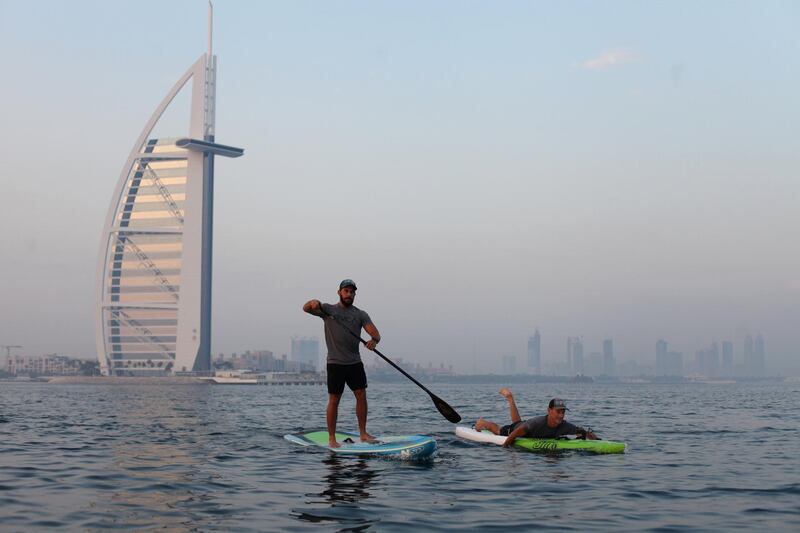It’s been a gruelling four months of training for Dubai residents Scott Chambers and Dean Cockle as they prepare to be the first UAE athletes to take part in the Molokai 2 Oahu Paddleboard World Championships in Hawaii on Sunday. The duo will compete alongside 150 of the world’s top paddleboarders.
The race, which is in its 23rd year, spans 52 kilometres, and requires athletes to get from the Hawaiian island of Molokai (home to the Kalaupapa National Historical Park) to Oahu (seat of the city of Honolulu).
In the top level, last year’s elite stand-up paddleboard winner, Australian athlete Travis Grant, completed the course in just four hours and 23 minutes, while prone champion Matt Bevilacqua did so in five hours and five minutes. The Tasmanian athlete broke the record time in 2016 at four hours and 29 minutes. Coming in as novices to the environment, the Dubai duo are realistic. Conditions prevailing, they hope to complete the race in six-and-a-half hours.
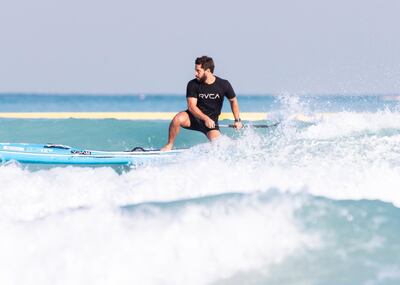
Training in the heat
Training as they are in the warm, warm waters of the Arabian Gulf, Chambers and Cockle begin their day at 4am, and spend close to six hours paddling for about 40km, in temperatures that quickly escalate to 40-plus degrees. They admit there have been times when they’ve both stopped to ask themselves and each other “why”.
“When it comes to these long distances, it’s mind over matter,” says Cockle, who is a commercial pilot. “You have to believe you can make it. You have to put in the physical effort, but the mental part is crucial.” To even contemplate embarking on such distances under competitive circumstances requires hundreds, if not thousands of hours in the water, adds Chambers, 35.
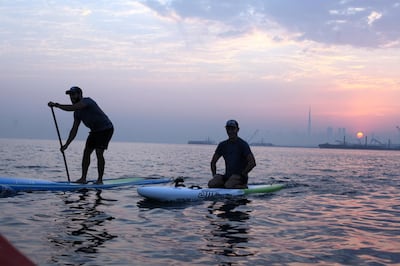
Like Cockle, he has been a surfer since he was a child, and first took up paddleboarding 12 years ago. “There are no shortcuts to developing the technique you only get after hours and hours. It looks simple, but can be quite technical,” he explains.
In addition to handling the equipment, there is the ocean knowledge to prepare for, too – knowledge that can put an athlete ahead of the rest. Cockle, 48, who hails from Australia, says understanding the swells, the wind and experiencing conditions far tougher than those in Dubai is critical, but with 20 years of paddling under his belt, he has done his time. The Pacific is notorious for its unpredictable strong currents, chops and swells, and waves can reach heights of 10 to 15 feet.
"Doing six hours on flat water in Dubai can be very monotonous," says Chambers, a father-of-one who was born in the UAE and is the co-founder of Surf House Dubai. However, he adds, practising during such hot, humid temperatures will prepare them well for the cooler climes of Hawaii. Like the high altitude effect, he hopes the adverse conditions of training in Dubai's heat will translate into faster race times in Hawaii on race day. The weather is expected to be in the low 30s, which in turn means hindrances such as cramps, should be much less, the pair hopes. "We also won't be gasping for air like we are here," notes Cockle.
During the event, each athlete must have a support boat alongside to provide food and hydration, but for now, the duo do this alone, packing as many sports gels and hydration drinks as they can for their sessions. “Carrying three litres on a long paddle does add weight, but it means we’ll feel lighter on the day.”
Workout routine and diet
Cockle’s flight schedules aside, the duo try and do their water-based training together as often as possible. They aim for three interval sessions for time and speed, and one long paddle of roughly 40km, in addition to two gym sessions a week, and cardio training, such as rowing or cycling, for endurance. “It’s been good to do the long paddles together,” admits Cockle. “When you’re on your own, you start to question why you’re doing it.”
While Chambers will participate in the race standing upright on a custom-designed 18-foot Sunova board, Cockle prefers the smaller 12-foot prone board, meaning he lays belly-down with no paddle, just his upper body strength to take him from start to finish. Consequently, he’s had to build muscular endurance over time.
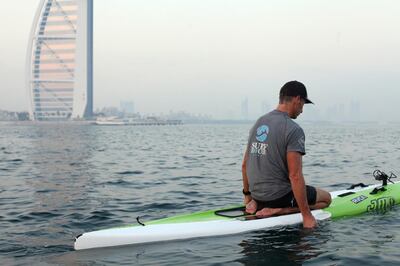
“I’ve had to really focus on training the smaller muscle groups; the forearms, the shoulders, my lats and my lower back,” says Cockle. For Chambers, who will be on his feet for the whole race, his core and back, in addition to his legs, are critical, and his routine takes in scores of medicine ball twists and lunges.
One thing neither can skip is recovery. Each week they are given sports massages from their sponsor clinic, Upandrunning, to get them through the relentless schedule. Father-of-two Cockle says: "Fitting it all in with my job is hard, but you have to. The body needs to recover."
Supporting the rigorous regime has also meant fuelling up. In addition to a high-calorie diet, consisting of a range of proteins, carbs, fruits and vegetables, the pair have been adding supplements including vegan protein, natural pre-workout formulas with ingredients such as acai and guarana, and prebiotics for gut and immune health. "We're trying to get into a rhythm of eating the same things before the paddle to prepare us for the day, so I'll have eggs and coffee," says Cockle. The night before, both eat a carb-heavy meal such as pasta, to ensure they wake up ready to take on the water. "You're constantly hungry," notes Chambers, with Cockle adding he's even lost weight despite eating more. "I add a lot more fruit and vegetables into the daily diet and I'm definitely eating more than I used to, even on the days when I'm not training as hard," says Cockle, confessing that his favourite cheat treats are chocolate milk, Weetabix and toasted sandwiches.
Prep and pep aside, in the end, it comes down to conditions that may quite simply be out of their control. "It's not like any other sport; you really don't know what the conditions are until the day and you see what Mother Nature has given you," says Cockle. "All the modern forecasting is pretty good, but it's not always accurate. We just have to hope it all goes well on race day."
Funding and future plans
It’s not only the physical preparations that have required the athletes’ dedication. The $18,000 (Dh66,000) trip for the pair has been made possible with a mix of crowdfunding and corporate sponsorships. From the $1,500 support boat necessary for each athlete to the $2,000 board, it has been no mean feat to fund various aspects from equipment to travel.
Having secured a title sponsor through Seafood Souq, and with support from other companies including RVCA apparel and Amazonia nutrition, the pair hope to reach the full target by race day. Any equipment bought for the event will be sold after to raise funds for the Christina Noble Children's Foundation.
As crunch time draws near, with the duo approaching the climax of a brutal four months, the future still feels a long way off. "What happens next? I can only answer that once I've finished," says Chambers with a sigh, the exhaustion of the gruelling regime he and his co-athlete are putting themselves through reflecting in his voice. He expects that if the pair complete the epic challenge, they will want to do more, and maybe even tougher crossings, perhaps locally.
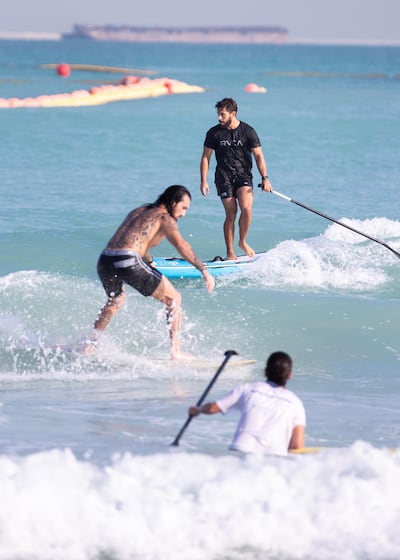
In recent years, paddleboarding has boomed, both at competition level thanks to organisations such as the Association of Paddlesurf Professionals, which runs such competitions, and recreationally, popular due to its accessibility for people of all ages and abilities.
“The race is going to be a means for us to learn a lot, so we’d like to bring those learnings back here to share with the UAE paddleboarding community and inspire others to do this, too,” concludes Chambers.
